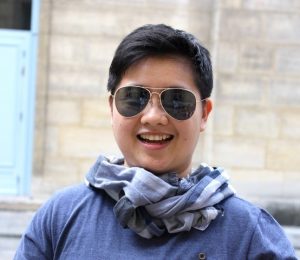
At the recent Nanyang Graduate Student Colloquium held on 17 February 2017 at NTU, two graduate students from the department won the Colloquium’s Best Presentation Awards. The two students are Grace Chong who is a first year Masters by research student in English Language and Phoebe Pua who is a first year PhD student in English Literature. Grace’s research interests are in contact linguistics and sociolinguistics, while Phoebe’s dissertation focuses on cinematic representations of Southeast Asia with an emphasis on sound.
We talk to Grace and Phoebe about their experience at the conference.
.Q: How did you hear about the conference?
PB: The Department often sends out CFPs for various conferences and I keep an eye out for the ones that are based in Singapore. I was excited about this conference organized by NTU as it centred on Asia, which is an area I am working to get more engaged with.
G: I heard about the conference through my supervisor, A/P Mie Hiramoto. She encouraged me to give it a shot to gain more exposure and meet people who may be in the same field as me.
Q: What made you want to submit a paper there? Was it A/P Hiramoto’s encouragement?
G: Yes, Mie’s encouragement, and also a genuine interest in finding out what it is like to actually attend a conference and present at one. I did not think too much about it after I submitted the paper, so I was really happy to be given the opportunity to present at the conference.
PB: The conference’s focus on Asia was attractive to me given the scope of my research. It was also a graduate students’ conference so it is, in one sense, a survey of what our peers are interested in and what kind of work is being conducted. I attended a couple of conferences before this one, but I would say that a graduate students’ conference can be a lovely foray into the academic world. And finally, practically, attending conferences in Singapore is a treat because it eliminates the hassle of travel and the need to scramble for funding.

Q: Did you present a whole new idea or a draft version of your ongoing research?
PB: Because I am still at the beginning of my program, any idea I have, really, is a new one. The paper that I presented came out of conversations had during the Graduate Research Seminar I attended last semester. I am indebted to Dr. Gilbert Yeoh who was the instructor for that class. Briefly, my paper was concerned with how the Southeast Asian imaginary is peddled on the international tourism market via a recent emergence of highly cinematic tourism advertisement videos (or travel films). It was titled “Your Government the Filmmaker: The Tourist Gaze under ASEAN Direction”.
G: I have a somewhat different story; what I presented was an extension of my honours thesis, which was in Mandarin (as I was originally from the Chinese Studies department) so I had to translate part of the paper into English. It looked at a unique feature of Singapore Mandarin: the beneficiary usage of the preposition gen. I expanded this topic and applied new theories from contact linguistics to give a new perspective on the issue.
Q: Did you find the conference enjoyable and also helpful to your paper?
G: I must say the conference helped me to tie down some loose ends that I did not have the opportunity to resolve when I was writing my honours thesis, and helped me to make the paper more coherent and comprehensive. It was also through the conference that I managed to draw a stronger conclusion, and demonstrate the relevance of the new theories I introduced into the paper that were not there in my honours thesis.
PB: I too found it enjoyable not least because I finally got to see the NTU Hive building, which is really unique in design. For me the most interesting thing was getting responses to my paper from people with whom I do not often get to interact— such as those from quantitative Sociology and state policy. That is the best thing about attending non-disciplinary conferences like this one.
Q: Congratulations again on winning the Best Presentation awards! How did you feel about winning?
G: I was really surprised. I have always had public speaking phobia so I practiced multiple times before the actual conference. I would especially like to thank A/P Mie Hiramoto and Wil, who listened to my dry runs for so many times, and gave me invaluable advice that helped improve my presentation. I would also like to thank A/P Mie Hiramoto and Dr Leslie Lee, for taking time to vet through my abstract, and patiently suggesting the changes that I could make to make it better. My classmates at the Graduate Research Seminar and Assist. Prof. Yosuke Sato also gave me great advice on how I can improve my abstract and conference presentation skills as we were given the opportunity to write abstracts and have mock presentations during the seminar. I am also grateful to my friends who encouraged me and believed in me more than I did in myself. Thank you so much, everyone!
PB: I am grateful for the organizers’ generosity though the award does feel somewhat undeserved. But I think this is testament to the education received in our Department and from our teachers. As I mentioned, Dr. Yeoh, whom I can always count on for honest feedback, played a key role in the development of this paper. I am also indebted to those who have taught me— a long list since I did my undergraduate studies in this department— but to name a few, A/P Valerie Wee, my supervisor, and Dr. Tania Roy, Dr. David Teh, and A/P John Phillips, whose graduate modules are in equalmeasure frustrating and gratifying. And of course, A/P Mie Hiramoto, to whom we both owe a great deal.